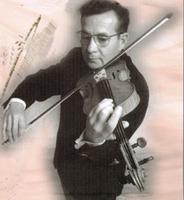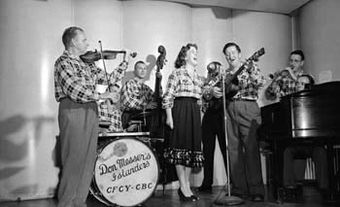
Jean “Ti-Jean” Carignan, CM, fiddler (born 7 December 1916 in Lévis, QC; died 16 February 1988 in Delson, QC). Jean Carignan was one of the greatest folk fiddlers of the 20th century and the leading exponent of the Celtic tradition in French Canadian fiddling. Acclaimed by folklorists and fellow violinists — from Louis “Pitou” Boudreault to Yehudi Menuhin and Henryk Szeryng — Carignan was known for his remarkable technical expertise, vast repertoire and joyful playing style. When he was made a Member of the Order of Canada in 1974 he was heralded as “the greatest fiddler in North America.”
Early Years
Carignan’s father, a mason, was also a fiddler. Carignan began playing at age four, learning his father’s repertoire of traditional tunes, and by age five he was performing on street corners in Lévis, near Québec City. At seven, he first heard a recording of famous French Canadian fiddler Joseph Allard. After Carignan’s family moved to Montréal, he studied with Allard (1927–31) and began to learn the repertoires of the Irish fiddler Michael Coleman and the Scotsman J. Scott Skinner. He continued to perform in the streets but was harassed by police; and at age 11 or 12, he became a shoemaker's apprentice.
Early Career
In his mid-teens, Carignan joined the Toronto-based country band George Wade and His Cornhuskers. Carignan played violin and occasionally clarinet and saxophone for about five years, and participated in the Cornhuskers’ Victor recordings. He returned to Montréal and led a small dance band at the St-André Dance Hall until 1954 while intermittently working in factories. He then played for two years with Bob Hill's dance band in the Montréal area. In 1956, he decided to perform only in concerts and at folk festivals, and took a day job as a taxi driver, which he held for 20 years.
1960–78
Carignan's performance association with Alan Mills took him to the 1960 Newport Folk Festival, the Winnipeg Folk Festival and the earliest of the Mariposa Folk Festivals, which he returned to numerous times until 1977. He appeared at many other festivals in North America and in Europe. In 1960, Carignan performed with Mills at Carnegie Hall. In 1975, the National Film Board (NFB) released the feature documentary Jean Carignan, violoneux, directed by Bernard Gosselin. In Carignan’s later years, the blind pianist and fiddler Gilles Losier became his accompanist.
At Montréal’s Théâtre Maisonneuve (Place des Arts) in 1976, Carignan led an orchestra (which included his twin brothers and fellow fiddlers Marcel and Rodolphe) in Veillée québécoise, a program of traditional songs and dances. In 1976, André Gagnon composed the Petit Concerto pour Carignan et orchestre, a work for two soloists — a fiddler and a classically trained violinist — that draws a witty analogy between the traditional style of the great country fiddler and the violin writing of Vivaldi or Bach. Carignan and Yehudi Menuhin performed the piece in an episode of the CBC-TV series The Music of Man in 1979. Menuhin was a friend and a great admirer of Carignan.
In 1978 Carignan played for Suite Carignan, a ballet based on his music, scored by Donald Patriquin, choreographed by Brian Macdonald and danced by Les Grands Ballets Canadiens de Montréal. Increasing deafness forced his retirement from music. He told Le Devoir journalist Nathalie Petrowski: “I am deaf because I live in Québec and I was obliged to earn my living, working in a shop with machines and power hammers.”
Legacy
Carignan strove for strict authenticity in his performances and adopted an uncompromising approach to his repertoire of some 7,000 reels, jigs and other dance tunes learned from Coleman, Skinner, Allard and Wellie Ringuette, among others. According to The Folk Music Sourcebook, “Carignan's technique is amazing, but more so the joy and energy with which he applies it. There are few players in any music who reach his degree of virtuosity without sacrificing feeling or originality.”
The most memorable tribute to Carignan came in 1973, when 400 fiddlers from across North America gathered at Ascot Corner, south of Montréal, to pay tribute to him as a wooden bust (by the sculptor Georges Morisette) was unveiled. In 1998, a three-CD set of 104 songs recorded at Carignan’s home in 1976 was released by Disques Tout Crin and the Canadian Museum of Civilization.
Awards
Honourary Degree, McGill University (1977)
Honourary Degree, University of Toronto (1977)
Member, Order of Canada (1974)
Prix de musique Calixa-Lavallée (1976)
Discography
For London (ca. 1958–62): Ti-Jean... Le Violoneux. Herbert Ruff (piano), Tony Romandini (guitar), Aldor Morin (caller). MB-4 (reissued on 2-Patrimoine PAT-19001).
Valses, reels et gigues: Philippe Bruneau (accordion). MB-32 (reissued on Patrimoine PAT-18012).
En hommage à l'atelier folklorique. Herbert Ruff (piano), Aldor Morin (spoons). MB-52 (re-issued in part on 2-Patrimoine PAT-19001/PAT-18009).
Jean Carignan... Le Violoneux. Philippe Bruneau (piano). MB-78 (reissued on Patrimoine PAT-18009)
Old Time Fiddle. Philippe Bruneau (accordion), Marcel Roy (piano), Rodolphe Carignan (guitar), Jean Ferland (double-bass). Elektra 266/Legacy LEG-120
For Folkways: Old Time Fiddle Tunes. FG-3531.
Songs, Fiddle Tunes and Folktales from Canada. Alan Mills (voice), Gilbert Lacombe (guitar). FG-3532.
For Philo (1973–6): Jean Carignan. Gilles Losier (piano). FI-2001.
Hommage à Joseph Allard. Gilles Losier (piano). FI-2012.
Hommage à Madame Bolduc. Jeanne d'Arc Charlebois (voice), Gilles Losier (piano and double-bass). FI-2014.
Coleman, Morrison and Skinner. FI-2018.
Jean Carignan (1975). RCI 621.
Ti-Jean Carignan, violoneux. Conducted by Gilles Losier (1975). Totem TO 9221/Jade AD-8618.
Ti-Jean Carignan (1976). CBC LM-438.
Patriquin, Fantasy and Hommage. McGill Chamber Orchestra, conducted by Alexander Brott (1977). Sel CC-15128.
Patriquin, Jean Carignan et l'Orchestre des Grands ballets canadiens, and Hangman's Reel et al. Conducted by Vladimir Jelinek, Gilles Losier (piano) (1980). McGill University Records 800l0.
Carignan also appears on recordings of the Newport Folk Festival (1960, Vanguard VSD-9083; 1963, Vanguard VSD-79149); and on the collections La Veillée des Veilées (1975, 2-Kébec Disc KD-928929); and Soirée québecoise (Promoson JPA-7503).
A version of this entry originally appeared in the Encyclopedia of Music in Canada.

 Share on Facebook
Share on Facebook Share on X
Share on X Share by Email
Share by Email Share on Google Classroom
Share on Google Classroom

